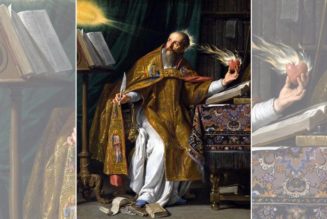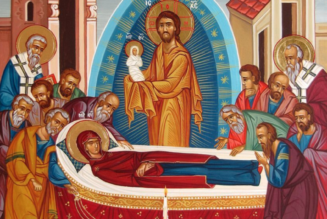[embedded content]
One of the biggest schools of thought in the Protestant world is known as Arminianism, and today we’re going to find out if an Arminian would need to change his views in order to become a Catholic.
Over thirty years ago, I wrote a piece called A Tiptoe Through Tulip, in which I explored how close a Catholic could be to Calvinism without violating Catholic teaching. I concluded—based on the thought of St. Thomas Aquinas—that he could be very close indeed!
This piece led some to think that I, myself, am a Thomist, though I am not. I’m not a member of any particular theological school within Catholicism. I’m just an orthodox Catholic.
For a long time, I meant to write a balance piece on how far away from Calvinism one could be without violating Catholic teaching, but I haven’t done that yet.
I decided, though, to go ahead and write a piece about the main rival to Calvinism in Protestant circles, which is known as Arminianism, and discuss it from a Catholic perspective. So that’s what we’re considering today.
Jacob Arminius
First, a bit of history to set the stage. Jacob Arminius was a theologian in Holland in the late 1500s. He had been taught by Calvin’s successor—Theodore Beza—but he came to question some of Calvin’s teachings. This led to a controversy, but before it could be settled, Arminius passed on to his reward in 1609 at the age of 49.
However, the next year—1610—Arminius’s followers put forward 5 claims based on his writings. His followers were called the Remonstrants.
To remonstrate means to lodge an objection, and Arminius’s followers were lodging objections to Calvinism, so they were call the Remonstrants.
The claims they made were known as the Five Articles of Remonstrance. In 1618 and 1619, a Dutch national synod was held known as the Synod of Dort, and the synod condemned the five articles.
But that did not put an end to the matter, and the Five Articles became the central tenets of Arminianism, which has become very influential in the Protestant world and is found among Anglicans, Baptists, Methodists, Holiness, and Pentecostal churches. In fact, Arminianism is the main rival to Calvinism.
Today we’re going to be looking at the Five Articles and considering whether a Catholic could agree with them.
- Conditional Election
Here’s the first article. Arminians hold:
Article 1
That God, by an eternal and unchangeable purpose in Jesus Christ his Son, before the foundation of the world, has determined, out of the fallen, sinful race of men, to save in Christ, for Christ’s sake, and through Christ, those who, through the grace of the Holy Ghost, shall believe on this his Son Jesus, and shall persevere in this faith and obedience of faith, through this grace, even to the end; and, on the other hand, to leave the incorrigible and unbelieving in sin and under wrath, and to condemn them as alienate from Christ, according to the word of the Gospel in John 3:36: “He that believes in the Son has everlasting life, and he that does not believe in the Son shall not see life; but the wrath of God remains on him,” and according to other passages of Scripture also.
What the Remonstrants are objecting to here is what is commonly known in Calvinism as Unconditional Election.
Unconditional Election is the idea that God has elected or chosen certain people to be saved on the last day, and he did this without them meeting any kind of condition. That’s why the election is said to be unconditional. God just picks certain people—for no reason connected with them—and decides that they will go to heaven.
The Remonstrants objected to this idea, and so in this article they say that God elected or chose “those who, through the grace of the Holy Ghost, shall believe on this his Son Jesus.” In other words, God chooses those who believe in Jesus to be saved, and the ones he does not choose to be saved are those who don’t believe.
So election is not unconditional on the Arminian view. There is a condition that needs to be met to be chosen by God—it’s whether you will believe in Jesus or not. And here we’re not talking about babies or the mentally handicapped or people who’ve never had a convincing presentation of the gospel. Those are separate issues. We’re talking about the normative, mainstream way of getting to heaven.
Because it’s not unconditional, the Arminian position is thus called Conditional Election.
So what would a Catholic make of it? Well—as we saw in my TULIP article—he would not have to agree with this, as there are Catholic figures like St. Thomas Aquinas who held to Unconditional Election. But he also would not have to disagree with this, because Catholic thought on this subject is mixed.
In Catholic circles, there are two schools of thought about when God predestines someone to go to heaven. One school says that God predestines them ante praevisa merita, which is Latin for “before foreseen merits,” and the other says God predestines people to heaven post praevisa merita, or “after foreseen merits.”
And—because the term merit has become theologically loaded since the Reformation—I should point out that it doesn’t mean that you “earn” heaven. As the Catechism of the Catholic Church points out:
With regard to God, there is no strict right to any merit on the part of man. Between God and us there is an immeasurable inequality, for we have received everything from him, our Creator (CCC 2007).
So don’t think of “merits” as earning heaven, though they do refer to good things that we do by God’s grace, such as believing in Jesus.
According to the first Catholic school of thought, God predestines certain people to go to heaven before he looks at their lives and sees if they do things like believe in Jesus and cooperate with God’s grace. This is equivalent to Unconditional Election, and this view is held by St. Augustine, by St. Thomas Aquinas, by the Thomists, and by some of the older Molinists.
The second school says that it’s the other way around. First God looks at a person’s life and sees if he does things like believe in Jesus and cooperate with grace and—if he does—then God predestines him to go to heaven. This view is held by most of the Church fathers—both Latin and Greek—by St. Albert the Great, by most Molinists, and by St. Francis de Sales.
This second position is equivalent to the Arminian view of Conditional Election, and since it’s a permitted Catholic opinion, an Arminian would not need to change his view upon becoming a Catholic.
In fact, in recent times the Church’s Magisterium has begun to use language that is suggestive of this view. For example, the Catechism of the Catholic Church says:
To God, all moments of time are present in their immediacy. When therefore he establishes his eternal plan of “predestination,” he includes in it each person’s free response to his grace (CCC 600).
In fairness, I should point out that here the Catechism is discussing the predestination of Christ’s death on the Cross. However, if this is a general principle that God uses when predestining other things, it would mean that—from his viewpoint outside of time—he takes into account “each person’s free response to his grace,” meaning that he predestines them conditionally rather than unconditionally.
- Unlimited Atonement
Now we turn to the Second Article of Remonstrance. Arminians hold:
Article 2
That agreeably thereunto, Jesus Christ the Savior of the world, died for all men and for every man, so that he has obtained for them all, by his death on the cross, redemption and the forgiveness of sins; yet that no one actually enjoys this forgiveness of sins except the believer, according to the word of the Gospel of John 3:16, “For God so loved the world, that he gave his only begotten Son, that whosoever believes in him should not perish, but have everlasting life.” And in the First Epistle of John 2:2: “And he is the propitiation for our sins: and not for ours only, but also for the sins of the whole world.”
Here the Remonstrants are responding to what is known in Calvinism as Limited Atonement, which is the idea that Jesus only died for those who will be going to heaven. His death did not atone for all human beings, but only for the elect.
Arminians reject that idea and take verses like 1 John 2:2 literally—that Christ died “for the sins of the whole world.” Their view is thus called Unlimited Atonement since it isn’t made for a limited group of people. Christ’s death atoned for everyone, and those who believe in Jesus get the benefits of that atonement.
What would a Catholic make of this? Frankly, he’d agree! As we saw in my TULIP article, this is one of the places where a Calvinist who becomes Catholic needs to modify his view to an extent, because the Catholic Church is very firm on the fact that Jesus died for everybody.
The Catechism of the Catholic Church states:
The existence in Christ of the divine person of the Son, who at once surpasses and embraces all human persons and constitutes himself as the head of all mankind, makes possible his redemptive sacrifice for all (CCC 616, emphasis in original).
An Arminian thus would not need to change his view on this point, either.
- Total Inability
We now turn to the Third Article of Remonstrance. Arminians hold:
Article 3
That man has not saving grace of himself, nor of the energy of his free will, inasmuch as he, in the state of apostasy and sin, can of and by himself neither think, will, nor do anything that is truly good (such as saving faith eminently is); but that it is needful that he be born again of God in Christ, through his Holy Spirit, and renewed in understanding, inclination, or will, and all his powers, in order that he may rightly understand, think, will, and effect what is truly good, according to the Word of Christ, John 15:5, “Without me you can do nothing.”
Here the Remonstrants are essentially affirming what is known in Calvinist circles as Total Depravity. However, that term has led to a lot of confusion, because it has led many people to think that Calvinists hold that humans are as wicked as they could possibly be—that they are totally depraved and can never do anything but constant evil.
But that’s clearly false. Your sweet little grandma is not Hitler or the Antichrist, and Calvinists know this. Consequently—despite the TULIP acronym—some have preferred other ways of expressing this point. For example, Calvinist Loraine Boettner referred to this point as “Total Inability,” meaning a total inability to turn to God without divine grace.
The Remonstrants essentially agree with that position, and so does the Catholic Church. The Council of Trent thus infallibly rejected the following proposition:
That without the anticipatory inspiration of the Holy Spirit and without his assistance man can believe, hope, and love or be repentant, as he ought, so that the grace of justification may be conferred upon him (Trent, Decree on Justification, can. 3).
So, yes, we all agree that we need God’s grace in order to be able to come to God. Because of original sin, we can’t do it on our own. God must take the initiative to give us his grace and enable us to come to him. An Arminian thus would not need to change his view on this point.
- Resistible Grace
We now turn to the Fourth Article of Remonstrance. Arminians hold:
Article 4
That this grace of God is the beginning, continuance, and accomplishment of all good, even to this extent, that the regenerate man himself, without prevenient or assisting, awakening, following, and cooperative grace, can neither think, will, nor do good, nor withstand any temptations to evil; so that all good deeds or movements, that can be conceived, must be ascribed to the grace of God in Christ. But respecting the mode of the operation of this grace, it is not irresistible; inasmuch as it is written concerning many, that they have resisted the Holy Ghost [in] Acts 7, and elsewhere in many places.
Here the Remonstrants are objecting to what in Calvinism is known as Irresistible Grace. According to Calvinists, God gives those he chooses an “efficacious grace” that infallibly assures that those who receive it will come to faith in Christ. They cannot resist it and refuse to come to faith, and so it is called Irresistible Grace.
Arminians disagree, and they commonly refer to the grace that God gives people as “prevenient grace”—as they do here. Prevenient means “coming before,” so this grace is given to you before you come to faith in Christ. However, they hold that this grace is not irresistible; people can refuse to act on the grace they are given and refuse to turn to God. This position is thus sometimes called Resistible Grace.
What would a Catholic make of this? First, Catholics have no problem with the concept of prevenient grace. The Catechism of the Catholic Church states:
Every time we begin to pray to Jesus it is the Holy Spirit who draws us on the way of prayer by his prevenient grace (CCC 2670).
You’ll note that this refers to prevenient grace being given to us every time we pray to Jesus, and it is generally understood that the same is true of every good action we perform—which is one of the things the Fourth Article of Remonstrance is concerned with. The Council of Trent stated:
Christ Jesus himself as the “head into the members” [Eph. 4:15] and “as the vine into the branches” [John 15:5] continually infuses his virtue into the said justified, a virtue which always precedes their good works, and which accompanies and follows them (Trent, Decree on Justification 16).
Second, the Catholic Church does not have a problem with the idea that prevenient grace can be resisted. The Catechism states:
God’s free initiative demands man’s free response, for God has created man in his image by conferring on him, along with freedom, the power to know him and love him. The soul only enters freely into the communion of love (CCC 2002, emphasis in original).
Third—although this goes beyond what the Remonstrants explicitly said in the Fourth Article—they held that God offers prevenient grace to everyone, making it possible for everyone to be saved if they would believe in Jesus. The Catholic Church agrees. The Second Vatican Council stated:
Since Christ died for all men, and since the ultimate vocation of man is in fact one, and divine, we ought to believe that the Holy Spirit in a manner known only to God offers to every man the possibility of being associated with this paschal mystery (Vatican II, Gaudium et Spes 22).
“Being associated with this paschal mystery” means being saved through Jesus.
In view of the above considerations, an Arminian would not need to change his views regarding prevenient grace.
- Conditional Perseverance
We now turn to the Fifth Article of Remonstrance. The Remonstrants stated:
Article 5
That those who are incorporated into Christ by true faith, and have thereby become partakers of his life-giving Spirit, have thereby full power to strive against Satan, sin, the world, and their own flesh, and to win the victory; it being well understood that it is ever through the assisting grace of the Holy Ghost; and that Jesus Christ assists them through his Spirit in all temptations, extends to them his hand, and if only they are ready for the conflict, and desire his help, and are not inactive, keeps them from falling, so that they, by no craft or power of Satan, can be misled nor plucked out of Christ’s hands, according to the Word of Christ, John 10:28: “Neither shall any man pluck them out of my hand.” But whether they are capable, through negligence, of forsaking again the first beginning of their life in Christ, of again returning to this present evil world, of turning away from the holy doctrine which was delivered them, of losing a good conscience, of becoming devoid of grace, that must be more particularly determined out of the Holy Scripture, before we ourselves can teach it with the full persuasion of our mind.
Here the Remonstrants are questioning what in Calvinism is known as Perseverance of the Saints, which is the belief that God will keep the elect from performing those actions that would cost them their salvation, so that all of them—without fail—will persevere in grace until the end of life and thus be saved on the last day.
In other words, if you are ever saved, God will stop you from committing mortal sin so that you would lose salvation.
At the time they drafted the Five Articles in 1610, the Remonstrants were questioning Perseverance of the Saints and suspected that people could lose their salvation, but they were not yet fully convinced that this was true. This is why they say that it “must be more particularly determined out of the Holy Scripture”—in other words, they needed to study the issue more.
By the time the Synod of Dort met in 1618 and 1619, they had become convinced that Perseverance of the Saints is false and that people can lose their salvation. This has been the standard belief among Arminian Christians ever since.
So, what would a Catholic make of this rejection of Perseverance of the Saints? He’d agree with it. The Catechism of the Catholic Church states:
Mortal sin is a radical possibility of human freedom, as is love itself. It results in the loss of charity and the privation of sanctifying grace, that is, of the state of grace. If it is not redeemed by repentance and God’s forgiveness, it causes exclusion from Christ’s kingdom and the eternal death of hell, for our freedom has the power to make choices for ever, with no turning back (CCC 1861).
The Catholic Church thus agrees with Arminians that it is possible for a person to lose salvation.
Fortunately, it also is possible to regain it, which ordinarily happens through the sacrament of confession. In any event, Catholics and Arminians are in agreement on the possibility of losing salvation, and so an Arminian would not need to change his view on this point.
In my TULIP article, we saw that it was possible for someone coming from a Calvinist background to embrace the Catholic faith with some modifications to his view, but here we have seen that an Arminian would be able to become Catholic without modifying his views on the points that we’ve covered.
* * *
If you like this content, you can help me out by liking, commenting, writing a review, sharing the podcast, and subscribing
If you’re watching on YouTube, be sure and hit the bell notification so that you always get notified when I have a new video
You can also support the podcast by going to Patreon.com/JimmyAkinPodcast
Thank you, and I’ll see you next time
God bless you always!









